
From Horseback Archery to the Blue Zone of Okinawa: A Student’s Journey Towards Ethical Tourism and Revitalization in Japan’s Countryside
What started as a curiosity about internships has grown into a passion for the revitalization of Japan’s countryside for 4th year student and Japan Studies major Yoana. In her internship, she has worked with Yanbaru Hotel Nammei Shinshitsu to bring ethical tourism to the Yanbaru region of northern Okinawa, which is designated as a “Blue Zone”.
At the start of 2025, Yoana was like many students approaching graduation, uncertain about the next step. Restless and determined to make the most of her winter break before the spring semester, she sought advice from her advisor, Dr. Darren Ashmore. He connected her with his former student working in the tourism industry in Japan, who encouraged her to explore internship opportunities.
Internship Experience with Yabusame
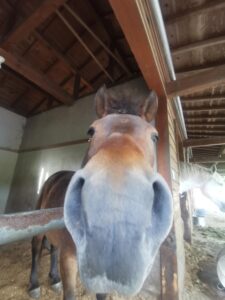

Although she had never seriously considered internships before, Yoana’s interest was piqued. Through multiple people, connections, and interviews, Yoana secured an internship with Barikiya in Fujiyoshida, a company involved with regional revitalization, but also offering tourist experiences in Yabusame, traditional Japanese horseback archery with roots in the Kamakura Period. Having ridden horses since she was three years-old in her home country of Bulgaria, Yoana was thrilled by the opportunity to work at a horse stable in Japan. Her responsibilities involved taking care of the horses and assisting in Yabusame experiences for tourists.
Interest in Regional Revitalization
The experience working with Barikiya deepened Yoana’s interest in revitalization and sustainable tourism to lesser-known destinations in Japan. Growing up in Sofia, the capital of Bulgaria, Yoana is a city girl. After moving to Japan during the COVID-19 Pandemic, Yoana initially visited Tokyo often, gravitating towards big city life. However, when Japan reopened its borders in 2022 and tourism boomed at an unprecedented rate, she found herself overwhelmed by the large crowds in Tokyo.
“I don’t think Japan is all about Shinkansen, cherry blossoms, and sushi. So I thought, how about I check out the countryside?” says Yoana, who subsequently decided to start backpacking.
Backpacking in the rural parts of Japan opened her eyes to the rich cultural heritage in the countryside, but also the troubling reality of depopulation.
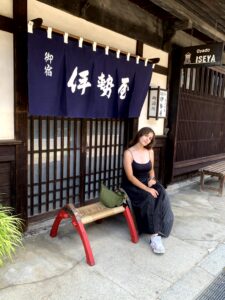
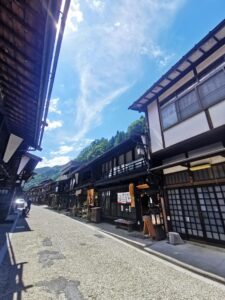
“I had no Japanese when I first came to Japan. But when you go to the countryside, you won’t have McDonalds, you’ll have restaurants run by grandmas and grandpas. When I look at them, I see my own grandparents. I would think, I have to support these people somehow,” Yoana explains.
“And when I sit there, they want to talk to me with my broken Japanese. But then one thing my dad always said to me was, if you want to understand somebody, you will find a way. With lots of hand gestures, drawing, and Google searching, I started to understand their stories.”
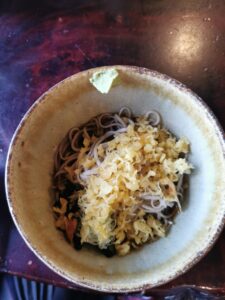
A particular occasion Yoana recalls, was when she enjoyed the most delicious bowl of tanuki soba at Narai Juku in Nagano Prefecture, served by an 89-year-old woman. In their conversation, she learned that the elderly owner was soon closing the shop permanently and ending generations of family ownership, as there was no one to succeed the store.
Yoana felt saddened that long-standing businesses are forced to close due to a declining and aging population in the countryside. There is a stark uneven distribution of visitors to Japan, as some places like Tokyo and Kyoto experience over-tourism. Encouraging visitors to see the lesser-known areas of Japan can boost regional revitalization and preserve local heritage. This experience made Yoana determined, and she was led to a life-changing internship in Okinawa.
Journey to Okinawa
When another internship opportunity came up in Okinawa, Yoana was initially skeptical, having a negative image of Okinawa from hearsay. At the time, her heart was already set on working with the horses.
“I took the internship because I will say yes to everything that comes my way, because I really believe in that,” she says.
Her initial arrival in Okinawa felt like a fever dream. “It’s a touristy place for Japanese people because it’s like they want to Americanize it, and it’s a touristy place for foreigners because they want to Japanize it. I’m like, where the heck am I?” she remembers, bewildered by how different the culture and architecture in Okinawa was.
Adding to that, she had unintentionally ended up staying in a hotel in the seedy red-light district of Naha. Feeling lost, she called her parents in tears. But she resolved to give the opportunity a chance.
What followed would transform her career path and outlook.
Community Involvement in Yanbaru
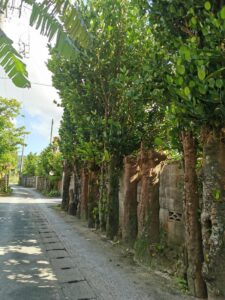
Yanbaru is an area north of Okinawa’s main island, made up of 3 villages: Ogimi, Kunigami, and Higashi. The nature-filled area features sprawling subtropical evergreen forests, secluded beaches, thriving mangroves, and impressive limestone cliffs. Okinawa is famously designated as a “Blue Zone”, which are regions in the world with a higher life expectancy rate in comparison to the global average. Yanbaru’s Ogimi and Kunigami villages have the highest longevity even within Okinawa.
Yoana started an internship with Yanbaru Hotel Nammei Shinshitsu. A local effort to revitalize the region, the owner of the Yanbaru Hotel Nammei Shinshitsu purchased and renovated Akiya, empty houses, turning them into accommodations for tourists. Visitors can stay and join tours to learn about the local arts, history, and culture. The hotel emphasizes respectful tourism: guests are asked not to photograph or film residents and their homes, or share precise locations online, ensuring privacy and harmony with the local community.
On a day-to-day basis, Yoana’s responsibilities included guest check-ins and check-outs, cleaning, and giving village tours. But Yoana was moved by how welcome she was to the community over the course of her internship.

When she first arrived to Yanbaru, she was picked up by her manager, who took her to the local farmer’s market. Every person in the market knew each other, and her manager proceeded to greet and introduce her to everyone. From the outset, Yoana felt the warmth of a close-knit community.
At night, she would have dinner at the local bar, where the owner would save her a seat and all the regular customers would know her by name.
“In the span of a week, I knew half of the village I was staying at,” laughed Yoana.
Yoana was able to get to know the residents, such as exercising alongside a group of 90-year-olds, and learning about their local lifestyle, beliefs, and customs. She met local master craftspeople such as a Bashofu textile artist, fifth-generation Awamori brewer, Okinawan boat builder, and Yachimun ceramic artist.
She got to know the kindness of the people. Residents would drop by with fresh vegetables and homemade miso simply because they wanted to share the good things in their life with others.
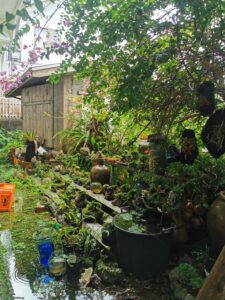
These interactions helped Yoana understand the deep communal ties that contribute to the region’s longevity. She believes that visitors to Yanbaru leave with not only an appreciation of local culture, but also a sense of personal enrichment.
“People do take away something from there,” says Yoana, “It might not be pictures, it might not be videos, but they come back from there with something much more unique, something much more intimate that you cannot replicate anywhere.”
After completing her internship, Yoana is getting ready to graduate in August. When she first came to iCLA, she had envisioned a career in the big metropolis of Tokyo. After seeing first-hand the meaningful and rewarding effects of ethical tourism on revitalizing rural regions in both her internships, now Yoana hopes to get involved in those efforts after graduating.
Although Yoana is a city girl, she is not worried about leaving the urban lifestyle behind. Her hobbies keep her preoccupied. Influenced by her father who owned a hi-fi audio equipment store, Yoana enjoys fixing faulty electronics from secondhand stores. She’s also passionate about sustainable fashion, proud that she has passed on all her outgrown clothes rather than discarding them.
Yoana’s advice for other iCLA students who also want to be proactive and engaged in the community is to avoid generalizing, be open minded, and be curious.
“Don’t believe everything you see online because it’s oversimplified. Things are much more diverse. Things are much more complicated. I went to Okinawa with negative expectations, and I came back with such a full heart and so many ideas.”

